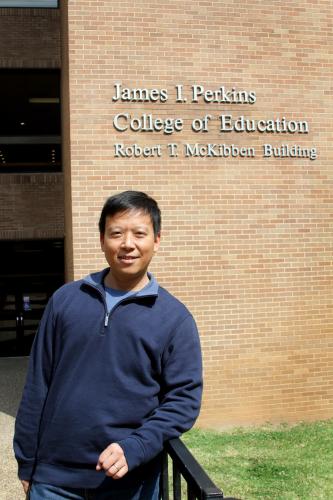NACOGDOCHES, Texas — The key to progress is knowledge. But what happens when access to knowledge is hindered?
Son Pham, a doctoral student enrolled in Stephen F. Austin State University’s Doctor of Education in educational leadership program, traveled more than 8,700 miles from his home in Vietnam to discover a solution to the social and organizational issues facing his country’s higher education system. He believes stepping outside of his country will help him find a new approach.
“In Vietnam, we have a lot of limitations to observe and investigate what is happening in our systems,” Pham said. “I believe by applying updated theories of education management with the view of comparative education, various current problems in Vietnamese education will be clarified and improved.”
Before becoming a Lumberjack, Pham worked in a senior-level position at Hoa Sen University where he led a nationwide communication campaign to reach high school students. Through his efforts, student enrollment almost doubled from about 6,800 to more than 12,200 students. The victory was bittersweet.
While enrollment and interest in the university increased, thousands of students failed the Vietnam national entrance exam. This roadblock encouraged Pham to analyze why this occurred and research how to improve the admission selection process and the effectiveness of public education management. He said this became his obsession.
“It pushed me to self-study to make it clear that there are many problems below the iceberg of this national college entrance examination, including central planning from the minister of education and the demand of society, training quotas control and corruption, linkage to the industrial labor force and more,” he said.
A connection in Houston brought Pham and his family to Texas, and he soon learned about SFA. In summer 2017, he enrolled in his first doctoral courses in the James I. Perkins College of Education after undergoing the extensive and competitive admissions process for international students and interviewing with doctoral program faculty members.
When he visited SFA, he said he “had a feeling” this was the university for him.
“First impressions are very important. When I was on campus, I had a nice, warm feeling,” Pham said. “The professor who interviewed me was caring.”
The university’s supportive and family-like atmosphere made Pham comfortable in selecting the school to continue his education.
“Even after some time, I can say this is the right choice. The faculty members support me, and I feel like they care about my progress and offer me opportunities,” he said.
As a doctoral student, Pham also doubles as a doctoral research assistant for the program. While he admits there has been a steep learning curve, he said he is thankful for the support, community contacts and opportunities the program has allowed him thus far.
Uprooting his family from Vietnam was difficult, but Pham praises SFA’s Office of International Programs for making the transition as smooth as possible. He has participated in a variety of campus events, such as the Office of Multicultural Affairs’ poverty simulation and diversity conference. He also read Vietnamese poetry during the Department of Languages, Cultures and Communication’s international poetry evening. For him, it is easy to continue his global education by becoming involved in the many cultural events on campus.
“I’m grateful to the international program for their support,” he said.
Throughout his educational journey, Pham has traveled to 16 countries and five continents to gain new perspectives. He earned his master’s degree in France and his undergraduate degree in Vietnam. At SFA, he will continue to seek advice from leaders and research ways to improve the educational system of his home country.
“Educational leaders have committed to work not only with but also on behalf of others who often might be the disadvantaged, disenfranchised, invisible and forgotten in our imperfect social systems,” Pham said. “I have faith in the education profession to make a difference, to bring about positive social change and to better society. Educational leadership is really the ‘profession of hope.’”
 Axe ’Em, Jacks!
Axe ’Em, Jacks!
